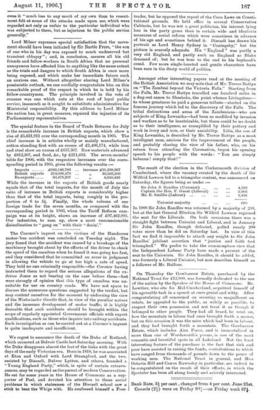We regret to announce the death of the Duke of
Rutland, which occurred at Belvoir Castle last Saturday morning. With the Duke disappears almost the last of the links with the great days of the early Victorian era. Born in 1818, he was associated at Eton and Oxford with Lord Strangford, and the two, assisted by Disraeli, Bulwer Lytton, and others, founded a "Young England Party," which, in spite of certain extrava- gances, may be regarded as the parent of modern Conservatism. He sat for some years in the House of Commons as a sup- porter of Peel, and devoted his attention to those social problems in which statesmen of the Diseaeli school saw a bask to beat the Whigs with. He confessed himself a Free- trader, but he opposed the repeal of the Corn Laws on Consti- tutional grounds. He held office in several Conservative Cabinets, but he was not a great politician, his interest lying less in the party game than in certain wide and idealistic measures of social reform which were sometimes in advance of his age and sometimes behind it. Disraeli has drawn his portrait as Lord Henry Sydney in " Coningsby," but the picture is scarcely adequate. His " England " was partly a very old England, and partly such an England as Blake dreamed of; but he was true to the end to his boyhood's creed. Few more single-hearted and gentle characters have been seen in the dusty world of politics.


































 Previous page
Previous page